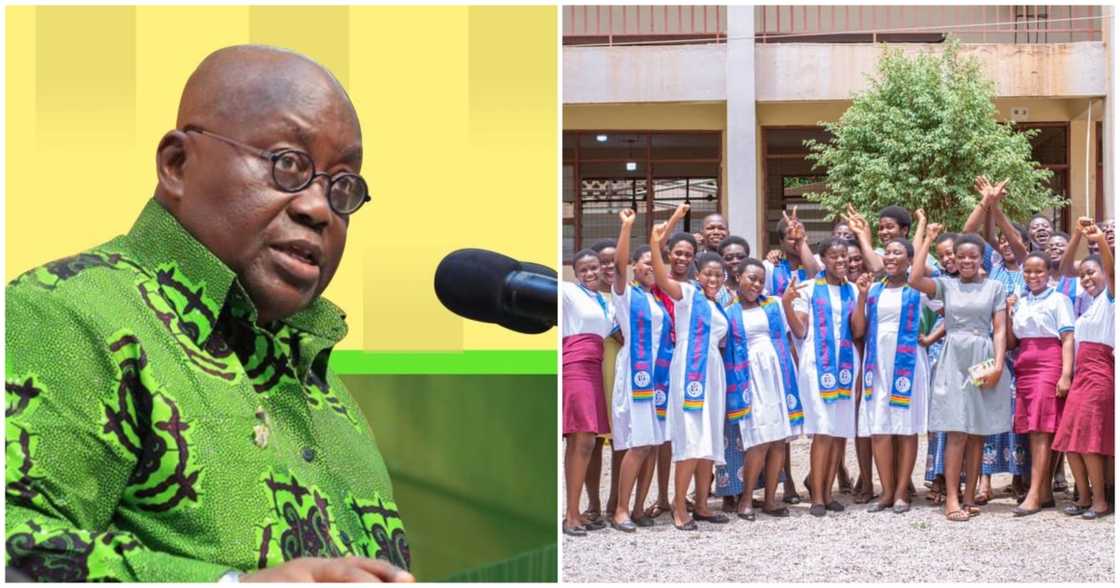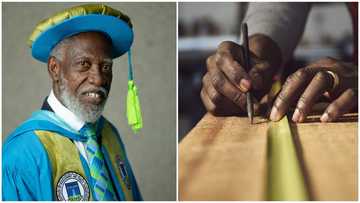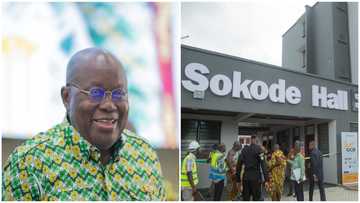Free SHS: Akufo-Addo Is Either A Stubborn Man Or A Visionary - What Experts Think
So many enlightened voices have called for a review of the Free Senior High School initiative. Even some of the hardened supporters of the education policy in its current form have been swayed. For them, the sound arguments for critical adjustments have sunk in. But President Nana Akufo-Addo remains unmoved. YEN.com.gh asked experts if the president is being stubborn or if posterity will judge him as a visionary.
New feature: Check out news exactly for YOU ➡️ find “Recommended for you” block and enjoy!
It has been tough for the Free SHS policy from the start. First, it was scorned as a gimmick for votes in the lead-up to the 2016 presidential election. Then mocked as an unsustainable education programme when it started in 2017 because it is revenue-guzzling. And now it has become a headache for parents, students, heads of schools, and the finance minister.
The Free SHS is bold – even too bold for Ghana's unsteady economy. Ideally, the government intends to absorb every aspect of the cost of educating the young Ghanaian entering secondary school.

Source: UGC
Ideally, this would mean free tuition, meals, boarding fee, admission fee, textbooks, library fees, science centre fees, fees for ICT, examination fees, and payment of utility fees. However, the situation has not been ideal for the past five years.
Free SHS challenges
For the many civil society organisations keeping a close eye on the policy, it is a mad house at some secondary schools. For example, a food shortage recently hit hundreds of public secondary schools. The situation was so bad that some schools considered shutting down and sending the students home.
PAY ATTENTION: Follow us on Instagram - get the most important news directly in your favourite app!
Decent accommodation for boarding students has remained another major problem. In some schools, dining halls have been converted into sleeping rooms. Because the Free SHS policy caused an explosion in enrolment numbers, the pressure on amenities has been debilitating. Due to the sheer numbers, some students at schools bordered by bushes and shrubs prefer to dash there for nature's call.
It gets worse. At a recent forum organised by the Centre for Social Justice (CSJ), former Vice Chancellor of the University of Ghana, Dr Ernest Aryeetey, presented research findings to show the quality of education at the Free SHS level has been declining. The study mentioned inadequate investment, which is reflected by poor infrastructure, facilities, and equipment, as one of the factors.
Making sense of Free SHS challenges

Source: Facebook
Education economist and executive director of the Institute for Education Studies (IFEST), Peter Partey-Anti, thinks despite the face-saving defence and explanations the government has put out for the often-cited challenges, it all comes down to two things: finance and operation.
The head of the education think tank told YEN.com.gh in an exclusive interview that the current system would present operational challenges even if the state had so much money to fund the very expensive policy flawlessly.
"Adopting a centralised system of running free SHS is very problematic. It must be decentralised to allow the school heads to be in charge of procuring food for their schools as it was before the introduction of free SHS," Mr Partey-Anti said.
He surmised that while the government's excuse that every government policy faces some challenges is true, it makes sense if it adopts a mindset to finetune previous structures and solve emerging problems.
"So even if the entire free SHS would not be reviewed, the president must at least allow the serious operational issues to be addressed once and for all," Partey-Anti said.
He stressed:
"The Free SHS must be decentralised and the Free SHS Secretariat turned into a monitoring agency."
Voluntary contributions

Source: UGC
Finance Minister Ken Ofori-Atta in 2017 proposed a mechanism that would enable voluntary contributions by old students, NGOs, and individuals to prop up Free SHS financing. Unfortunately, that suggestion by one of the president's righthand men has not been taken up. But Peter Partey Anti thinks it is time for that proposal to be pursued.
"For the past weeks, we have seen parents and other groups of people supporting schools to feed the kids. So…this voluntary contribution is a good idea. The Free SHS Secretariat at the district level can be used to ensure that such donations are spread across schools in the district uniformly," Partey-Anti chipped in.
The IFEST Executive Director said even if a review of the financing model of the Free SHS is what the president is scared about, reviewing the "operational model" and setting up a channel to get financial "help" from the public should be okay for him.
"However, a comprehensive review of the policy that will touch on the financing model adopted would be great in the long term," he said.
Where is the money?
The finance minister said on Monday, July 25, 2022, during the 2022 midyear budget review, that some GH¢ 5.3 billion has been invested in the flagship education programme to enable 1,261,495 Ghanaian children to access secondary education for free. But some experts think the government's claims that it has pumped billions into the free education policy raises some doubt.
Nii Armah Addy, a fellow of the Educational Pillar of the Centre for Social Justice (CSJ), thinks feeding and other challenges recorded in some schools make the figures quoted as expenditure on the policy hard to take.
"Resources for quality learning are woefully inadequate, yet this government tells us that it puts so much money into the free SHS. If you check the records, how much was spent in 2015 on education and what has been spent now, you see a big difference.
"This is probably because of the Community Day SHS the government was building at the time. But we have not seen a lot of infrastructure, yet this government claims it is spending so much," Mr Addy said.
He said ensuring students have healthy meals is so critical to quality education that the feeding challenges recorded at some schools are unacceptable.
"If the number of students keeps increasing and parents keep asking for quality…then feeding is critical. Feeding is a big factor in achieving quality because if you are hungry, you can't study. So if the calls for quality are intensifying, then government must increase its budget for feeding, and if it cannot do it, then it means that the policy must be reviewed," he said.
Why is Akufo-Addo unwilling to review Free SHS?

Source: Facebook
The signs are on the wall. The Free SHS must be reviewed if the true purposes of the policy would be achieved, according to experts. But that probably will not happen, and Nii Armah Addy knows why.
"The only reason the president is doing what he is doing is political mathematics. The idea is that once people run through the system and know that they got education for free, then in a way they will feel indebted to the government," he told YEN.com.gh in an exclusive interview.
Mr Addy said because the free SHS was one of the major reasons the NPP won the 2016 elections, and they seem to do well in areas where there are a lot of students, keeping the free SHS as it is has become a political imperative.
But the CSJ Fellow says that will soon change.
"The students are not naïve. Once they see how bad things are, they will change their focus," Mr Addy has predicted.
With the International Monetary Fund (IMF) in the picture now to whip the government in line about how it spends state revenue, maybe the mega budgets for the Free SHS funding would be scrutinised.
If the IMF makes a review of the policy a requirement for a bailout programme, then perhaps Akufo-Addo would be compelled to allow willing and able parents to take up a bit of the burden. If that does not happen, as he has stated will not happen, then we can all wait for the president to be proven wrong or right.
New feature: Check out news exactly for YOU ➡️ find "Recommended for you" block and enjoy!
Source: YEN.com.gh







